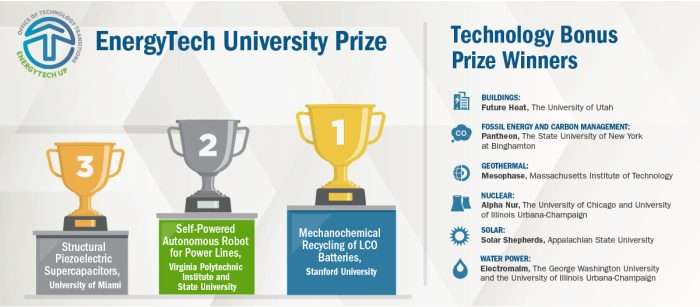Self Powered Autonomous Robot (SPAR) for Powerline Inspection Named Winner in EnergyTech University Prize National Finals

Advancing from the Carolinas Regional competition, sponsored by the Research Triangle Cleantech Cluster (RTCC), a student team from Virginia Tech was honored for their innovative energy technology business plans at the national competition.
Raleigh, NC – A student team from Virginia Polytechnic Institute & State University was named as a winner in the EnergyTech University Prize, a national competition sponsored by the U.S. Department of Energy Office of Technology Transitions in partnership with American-Made Challenges. Teams were charged with identifying an innovative energy technology, assessing its market potential, and proposing a strategy for commercialization. The EnergyTech University Prize is designed to be approachable, equitable, and scalable nationwide, with winners chosen based on the strength of their proposal, not the strength of their background.
Named as the second-place winner in the overall national competition was the team from Virginia Polytechnic Institute & State University, with a self-powered autonomous robot (SPAR) for overhead powerline inspection, providing electric utilities a compact, energy-efficient, cost-effective way to provide simultaneous vibration control and condition monitoring of powerlines. The SPAR adapts to wind conditions and provides optimal vibration suppression.
“We developed the SPAR to provide utilities with a cost-effective, sustainable power line maintenance solution,” explained Andrew Choi, graduate research assistant and captain of the Virginia Tech student team. “Overhead power lines frequently experience premature structural failure caused by wind-induced vibration, vegetation encroachment, and other hazards, resulting in tens of billions of dollars of losses each year.”
The Research Triangle Cleantech Cluster (RTCC), a not-for-profit organization leveraging the unique concentration of industry, academic, and government leaders in the Research Triangle to accelerate growth and leadership of the cleantech economy, sponsored the regional competition and provided guidance and support for the student teams throughout the process.
“We congratulate the winning team and are thrilled to have this opportunity to support the next generation of clean energy leaders,” said Dr. Deb Wojcik, Executive Director of RTCC. “We are grateful to our industry and academic partners for their support and leadership throughout the competition as we work together to advance the clean energy innovations we need now and in the future.”
About the U.S. Department of Energy Office of Technology Transitions
The mission of the Office of Technology Transitions (OTT) is to expand the public impact of the department’s research and development (R&D) portfolio to advance the economic, energy, and national security interests of the nation. As the front door to DOE’s products, facilities, and expertise, OTT integrates “market pull” into its planning to ensure the greatest return on investment from DOE’s R&D activities to the taxpayer. For more information, visit https://www.energy.gov/technologytransitions/office-technology-transitions.
About Research Triangle Cleantech Cluster (RTCC)
The mission of the Research Triangle Cleantech Cluster (RTCC) is to accelerate growth and leadership of the cleantech economy, leveraging the unique concentration of industry, academic, and government leaders in the Research Triangle to create benefits through innovation, deployment, and talent in the region, North Carolina, and beyond. For more information, visit www.researchtrianglecleantech.org.


